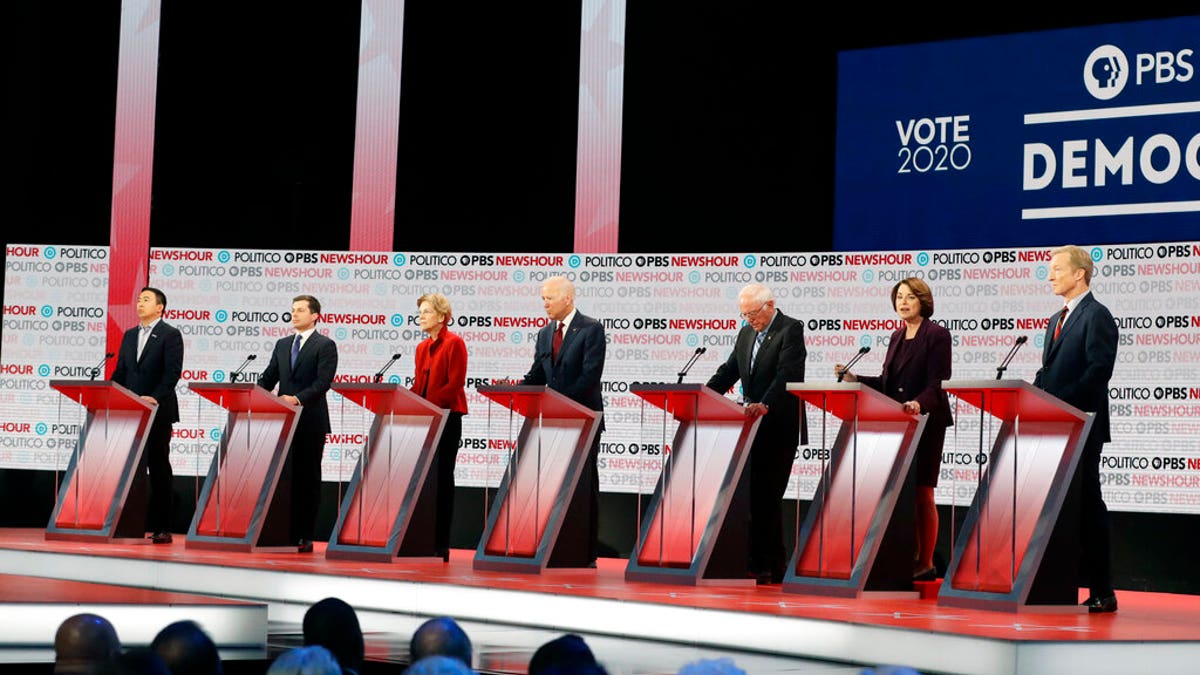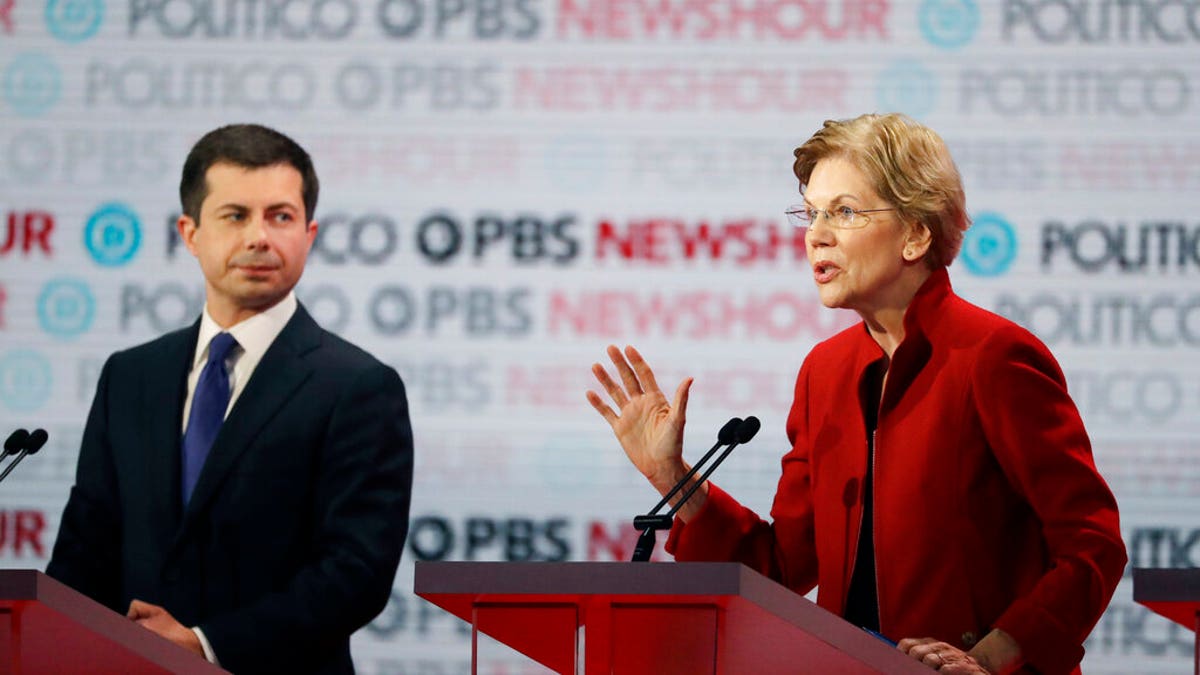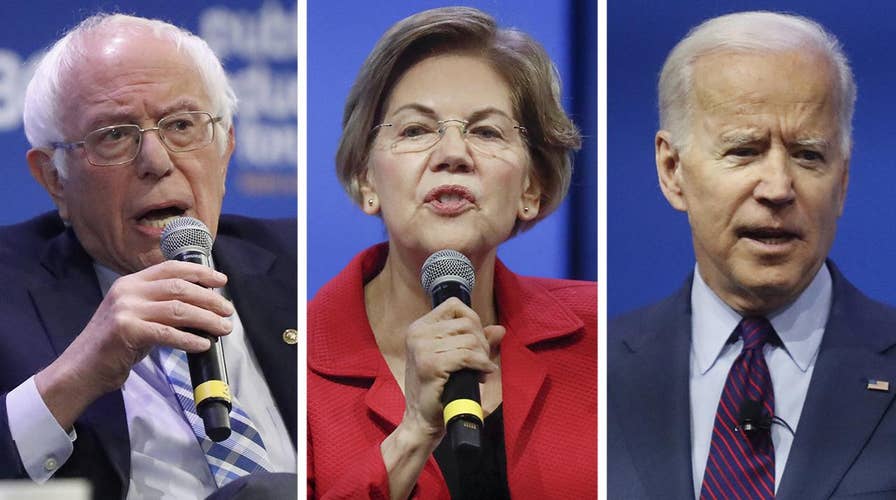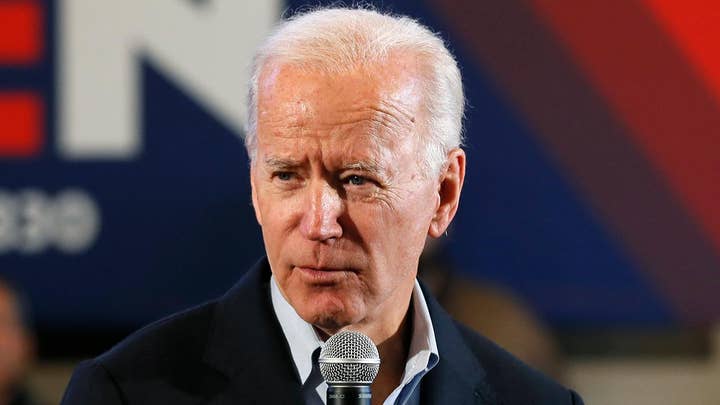Democratic presidential candidates weigh in on Trump impeachment ahead of debate
Joe Biden uses impeachment to ask supporters for money; Peter Doocy reports from Los Angeles.
Long-simmering tensions boiled over at Thursday night's 2020 Democratic presidential primary debate in Los Angeles, as a blunt one-on-one sparring match erupted between Pete Buttigieg and Elizabeth Warren over their fundraising -- just minutes after businessman Andrew Yang slammed Democrats' "obsession" with President Trump and impeachment.
Warren, a U.S. senator from Massachusetts, began the fiery exchange by criticizing Buttigieg's recent lavish fundraiser in Napa, Calif., saying he was cavorting with "billionaires in wine caves" -- prompting Buttigieg to retort that Warren, a multimillionaire, was a populist in name only.
"You know, according to Forbes magazine, I'm literally the only person on this stage who is not a millionaire or billionaire," Buttigieg, the mayor of South Bend, Ind., said. "This is the problem with issuing purity tests you yourself cannot pass."
BIDEN SAYS 'YES' WHEN ASKED ABOUT SACRIFICING BLUE-COLLAR JOBS FOR CLEAN ENERGY
Democrats, Buttigieg argued, are "in the fight" of their "lives," and need all the support they can get -- whether from the wealthy or otherwise. He added that he'd gladly accept a donation from Warren if she were to offer one.
"We shouldn't try to [defeat Trump] with one hand tied behind our back," Buttigieg said.
Sen. Bernie Sanders, I-Vt., then dismissively referred to Butitigeg as an "energetic guy," sarcastically saying he could "take on" former Vice President Joe Biden's corporate connections as the two secretly courted big-money donors, drawing jeers. Sanders noted that Biden has 44 billionaire contributors, while Buttigieg was "trailing" with only 39.
Sen. Amy Klobuchar of Minnesota then interjected: "I did not come here to listen to this argument. ... I have never even been to a wine cave."
"I did not come here to listen to this argument. ... I have never even been to a wine cave."
She went on to say she wanted the Supreme Court's Citizens United decision overturned by constitutional amendment. The 2010 decision declared unconstitutional the federal regulation of campaign expenditures by corporations and unions in connection with campaigns.
It was just one of several Klobuchar moments during the debate that resonated in the debate hall at Loyola Marymount University -- even as conservative commentators winced.
"The 'moderate' Klobuchar just advocated for a constitutional amendment that would give government control over free political speech," the Wall Street Journal's Kimberly Strassel wrote on Twitter. "This is 'moderation' in today's Democratic Party."
Separately, Klobuchar unloaded on Buttigieg, after he remarked: "If you want to talk about the capacity to win, try putting together a coalition to bring you back to office with 80 percent of the vote as a gay dude in Mike Pence's Indiana."
Klobuchar shot back: “If you had won in Indiana, that would be one thing. You tried and you lost by 20 points.” That was an unsparing reference to Buttigieg's failed bid to become Indiana state treasurer.
She also remarked, "When we were in the last debate, mayor, you basically mocked the 100 years of experience on the stage. ... You should respect our experience."
The spat over fundraising erupted shortly after Yang threw cold water on the media's "obsession" with impeachment, saying Americans become frustrated "the more we act like Donald Trump is the cause of all our problems."
Iowa caucuses near
It was a heated beginning to a wide-ranging debate with less than seven weeks to go until Iowa’s caucuses kick off, and just a day after House Democrats voted to impeach Trump. The winnowed field of seven Democratic presidential contenders was on the debate stage for a sixth and final time in 2019.
"If you turned on cable network news today, you would think [Trump's] our president because of some combination of Russia, racism, Facebook, Hillary Clinton and emails all mixed together," Yang said. "But Americans around the country know different. We blasted away 4 million manufacturing jobs that were primarily based in Ohio, Michigan, Pennsylvania, Wisconsin, Missouri."
He added, to applause: "What we have to do, is we have to stop being obsessed over impeachment ... and start actually digging in and solving the problems that got Donald Trump elected in the first place."
"What we have to do, is we have to stop being obsessed over impeachment ... and start actually digging in and solving the problems that got Donald Trump elected in the first place."
(At the end of the debate, Yang sounded a note of self-deprecation: "I know what you're thinking, America. How am I still on the stage with them?")
But, other Democrats largely echoed their previous attacks on the president's dealings with Ukraine, and his assertions of executive privilege to block administration officials from testifying.
“The president is not king in America,” said Klobuchar, who is preparing to serve as a juror as Trump's impeachment shifts from the House to a Senate trial. Alluding to President Richard Nixon, she added, "If the president claims that he is so innocent, then why doesn't he have all the president's men testify?"
Klobuchar went on to call Trump's actions a "global Watergate." Democrats' inference that Trump is guilty because he does not voluntarily permit his deputies to testify has rankled Republicans, who assert the importance of the presumption of innocence.
Biden then knocked Trump's argument that less than half of Americans support his removal from office.
“He's dumbing down the presidency beyond what I even thought he would do,” Biden said. “We need to restore the integrity of the presidency.”

Democratic presidential candidates from left, entrepreneur Andrew Yang, South Bend Mayor Pete Buttigieg, Sen. Elizabeth Warren, D-Mass., former Vice President Joe Biden, Sen. Bernie Sanders, I-Vt., Sen. Amy Klobuchar, D-Minn., and businessman Tom Steyer stand on stage during a Democratic presidential primary debate Thursday, Dec. 19, 2019, in Los Angeles. (Associated Press)
Later, Democrats largely defended Trump's breakthrough U.S.-Mexico-Canada Agreement, which the House passed hours earlier.
However, candidates railed against Trump's economy, despite multiple indicators that the economy is doing well. The U.S. unemployment rate stands at a half-century low of 3.5 percent, backed by consistently strong job gains in recent months that have largely squelched fears of a recession that had taken hold over the summer.
“This economy is not working for most of us," Buttigieg said.
"The middle class is getting killed,” Biden added. He said the economy was not "on kilter."
In response to a question as to whether he would commit to running for a second term if elected, amid a Politico report that he has privately said he would retire after four years in the White House, the 77-year-old Biden announced that he would not -- saying his focus is on winning a first term.
When a moderator told the 70-year-old Warren she would be the oldest president ever elected upon her inauguration, she retorted that she would also be the youngest woman ever elected to the presidency, drawing applause.
The line was previously used by Hillary Clinton.
Thursday night's televised contest, sponsored by PBS NewsHour and Politico, brought seven rivals to heavily Democratic California, the biggest prize in the primary season and home to 1 in 8 Americans.
Declining viewership
The debate could turn out to be the least-watched so far, as the holidays approach and impeachment drama dominates the news. Viewership has declined in each round though five debates, and even campaigns have grumbled that the candidates would rather be on the ground in early voting states than again taking the debate stage.
Republicans have slammed House Democrats' plan to delay a Senate trial. Hours before the debate, Noah Feldman, the Harvard Law School professor who testified for Democrats at the impeachment inquiry earlier this month, wrote an explosive op-ed asserting that if Democrats do not forward the impeachment articles to the Senate as dictated by the Constitution, then Trump was never even impeached at all. The Constitution dictates that after impeachment by a majority in the House, a two-thirds vote is needed in the Senate to remove a president from office.
Asked why polls show that many Americans oppose impeaching and removing Trump, Biden called impeachment a "constitutional necessity," regardless of what the numbers show.
Warren, for her part, accused Trump of corruption, without addressing the popularity of impeachment.
Klobuchar also suggested that the U.S. would "probably" need to relocate Americans away from places impacted by climate change, including possibly Miami.
Yang, meanwhile, advanced the idea of using thorium to help address the nation's energy needs.

Democratic presidential candidate Sen. Elizabeth Warren, D-Mass., right, speaks as South Bend Mayor Pete Buttigieg listens during a Democratic presidential primary debate Thursday, Dec. 19, 2019, in Los Angeles. (Associated Press)
No clear front-runner
The lack of a clear front-runner in the Democratic field came as Democrats complained that there would be a notable lack of diversity onstage Thursday as compared to earlier debates. For the first time this cycle, the debate didn't feature a black or Latino candidate.
The race in California has largely mirrored national trends, with Biden, Sanders and Warren clustered at the top of the field, followed by Buttigieg, Klobuchar, Yang and billionaire philanthropist Tom Steyer.
Conspicuously missing from Thursday's lineup was former New York City Mayor Michael Bloomberg, a billionaire who is unable to qualify for the contests because he is not accepting campaign donations. But even if he's not on the podium, Bloomberg has been felt in the state: He's running a deluge of TV advertising in California to introduce himself to voters who probably know little, if anything, about him.
Bloomberg's late entry into the contest last month highlighted the overriding issue in the contest -- electability, a sign of the unease within the Democratic Party about its crop of candidates and whether any is strong enough to unseat an incumbent president. The eventual nominee will be tasked with splicing together the party's disparate factions — a job Hillary Clinton struggled with after defeating Sanders in a long and bitter primary fight in 2016.
DEBATE IS ON: DEAL REACHED IN UNION DISPUTE THAT THREATENED TO SIDETRACK SHOWDOWN
Biden adviser Symone Sanders said to expect another robust exchange on health care.
“This is an issue that is not going away and for good reason, because it is an issue that in 2018 Democrats ran on and won," she said.
Jess O'Connell with Buttigieg's campaign said the candidate will “be fully prepared to have an open and honest conversation about where there are contrasts between us and the other candidates. This is a really important time to start to do that. Voters need time to understand the distinctions between these candidates.” The key issues: health care and higher education.
The unsettled race has seen surges at various points by Biden, Warren, Sanders and Buttigieg, though it's become defined by that cluster of shifting leaders, with others struggling for momentum. Sen. Kamala Harris of California, once seen as among the top tier of candidates, shelved her campaign this month, citing a lack of money. And Warren has become more aggressive, especially toward Buttigieg, as she tries to recover from shifting explanations of how she’d pay for “Medicare for All” without raising taxes.
In a replay of 2016, the shifting race for the Democratic nomination has showcased the rift between the party's liberal wing, represented by Sanders and Warren, and candidates parked in or near the political center, including Biden, Buttigieg and Bloomberg.
Two candidates who didn’t make the stage will still make their presence felt for debate watchers with ads reminding viewers they’re still in the race.
APPELLATE COURT DEMANDS HOUSE DEMS EXPLAIN WHETHER IMPEACHMENT VOTE RENDERS THEIR LEGAL CASE 'MOOT'
Sen. Cory Booker of New Jersey and former Housing Secretary Julián Castro aired television ads targeted to primary voters during the debate. Booker’s was his first television ad, and in it he said even though he wasn't on the debate stage, “I’m going to win this election anyway.” It aired as part of a $500,000 campaign, running in Iowa, New Hampshire, Nevada and South Carolina, as well as New York, Washington, D.C., and Los Angeles.
A pro-Booker super PAC is also going up with an ad in Iowa highlighting positive reviews of Booker’s past debate performances.
Meanwhile, Castro is running an ad, in Iowa, in which he argues the state should no longer go first in Democrats’ nominating process because it doesn’t reflect the diversity of the Democratic Party.
Both candidates failed to hit the polling threshold to qualify for the debates and have in recent weeks become outspoken critics of what they say is a debate qualification process that favors white candidates over minorities.
Fox News' Paul Steinhauser and The Associated Press contributed to this report.














































